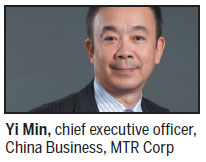MTR Corp, the operator of Hong Kong's metro system, will continue developing new subway lines in Beijing over the next five years, as it pursues a larger foothold in a lucrative urban market with more access to companies from Hong Kong.
Beijing MTR Corp, a joint venture formed by MTR, Beijing Capital Group and Beijing Infrastructure Investment Co, is looking to participate in the upcoming Beijing metro lines such as Line 12 and Line 17, as well as the new airport line to fuel its robust growth. It currently operates the Daxing Line, Beijing Metro Line 4 and Line 14.
Yi Min, chief executive officer for MTR's mainland business, said Beijing has an early bird advantage over others in terms of public-private partnerships. Such ventures help the government reduce spending on public transport services, optimize traffic efficiency, and bring more international experiences and conveniences to commuters.
With both the central and Beijing municipal governments encouraging the PPP model to diversify economic structure and improve public services, Beijing MTR Coro signed a PPP concession agreement with the Beijing government for Beijing Metro Line 16 in February.
Under the agreement, Beijing MTR will participate in the investment, operations and maintenance of the new line.
The concession period is for 30 years with Phase 1 targeted to open by the end of 2016 and the full line in operation after 2017. Beijing Metro Line 16 is 50 kilometers long with 29 stations
Beijing was the first city on the mainland to build a metro system, and there are now 18 lines covering a total distance of 527 km, according to the Beijing Municipal Commission of Development and Reform, the city's top economic planning agency.
The total length is expected to reach around 1,000 km by 2020 to meet the huge demand from the capital's population of more than 21 million. The expansion should ease traffic congestion and cut air pollution.

Unlike metro operators in the mainland and other parts of the world, MTR has a wide business portfolio, including residential and commercial property development projects, property leasing and management, advertising, telecommunications and international consultancy services, in addition to its railway operations.
"Bringing expertise in metro development and property management to top-tier cities such as Beijing, Shenzhen and other cities planning metro lines is a core component of the company's strategy for continued growth in the vast mainland market," said Yi.
However, rising cost of materials, labor, machinery and land acquisition and resettlement has made building metro lines in Beijing even more expensive.
"Construction costs for metro lines have almost doubled in the past six years, said Hou Hanping, a professor of public transportation at Beijing Jiaotong University.
Construction costs grew to 1 billion yuan ($157 million) per km in 2014 for subway lines in the downtown areas. The corresponding figure in 2007 was 571 million yuan, according to a report by the Beijing Infrastructure Investment Co released in April.
|
An employee of Beijing MTR Corp answers a passenger's questions in Beijing. Provided to China Daily |